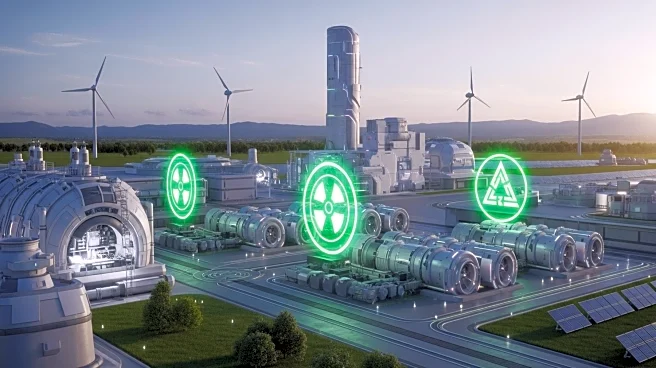What's Happening?
The U.S. is experiencing a renewed interest in nuclear recycling, driven by a policy shift and private sector initiatives. This marks the first endorsement of nuclear recycling since the Carter administration. Several American companies are advancing commercial-scale recycling concepts aimed at recovering valuable fissile material, reducing waste volume, and supplying next-generation reactors. Historically, nuclear recycling in the U.S. was primarily focused on military applications, but recent developments are targeting civilian reactor fuel. The Trump administration's executive orders in May 2025 have directed the Department of Energy to establish government-owned, contractor-operated recycling facilities, aiming to secure a supply chain for high-assay low-enriched uranium (HALEU). The Nuclear Regulatory Commission is also engaging with the industry on licensing pathways.
Why It's Important?
The revival of nuclear recycling in the U.S. has significant implications for energy security and waste management. By recovering valuable materials from spent nuclear fuel, the U.S. can reduce its reliance on foreign sources, particularly Russia, which is currently the sole commercial producer of HALEU. This move could also extend the life of nuclear waste repositories by reducing the volume and heat load of waste. Financially, recycling could offer cost savings by utilizing the fissile content in spent fuel, which is currently a liability. The initiative aligns with the growing demand for advanced reactor fuels, which require higher enrichment levels. This shift could bolster the U.S. nuclear industry, providing a strategic advantage in global energy markets.
What's Next?
The next steps involve overcoming technological and economic hurdles to make nuclear recycling cost-effective. Companies like Curio, Oklo, and SHINE are developing innovative recycling processes, with plans for market entry in the early 2030s. These efforts will require significant infrastructure development and regulatory approval. The U.S. government and private sector must collaborate to establish recycling facilities and ensure the economic viability of these initiatives. Public engagement and licensing will be critical to the success of these projects, as they face challenges similar to those encountered in previous nuclear endeavors.
Beyond the Headlines
The revival of nuclear recycling in the U.S. could lead to long-term shifts in energy policy and environmental management. By treating nuclear waste as a resource, the U.S. can foster a circular economy model, reducing environmental impact and enhancing sustainability. This approach may also influence global nuclear policies, encouraging other countries to adopt similar strategies. Ethically, the initiative addresses proliferation concerns by embedding safeguards in recycling processes, ensuring that recovered materials are used responsibly.











